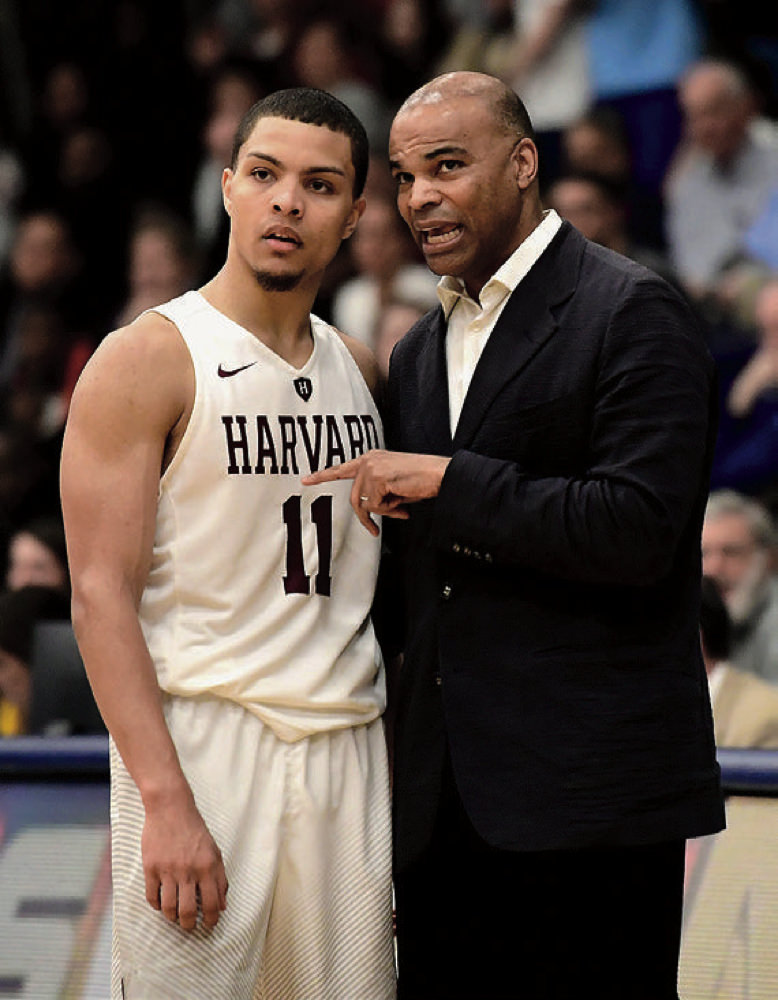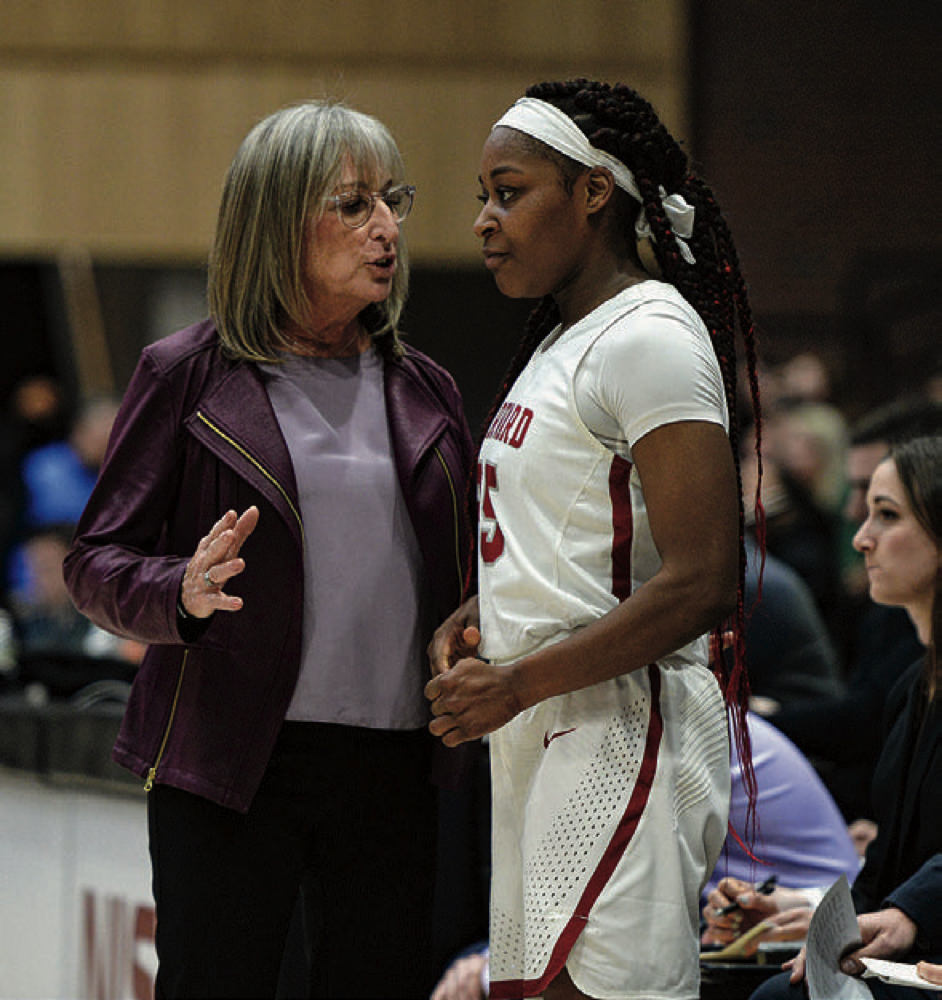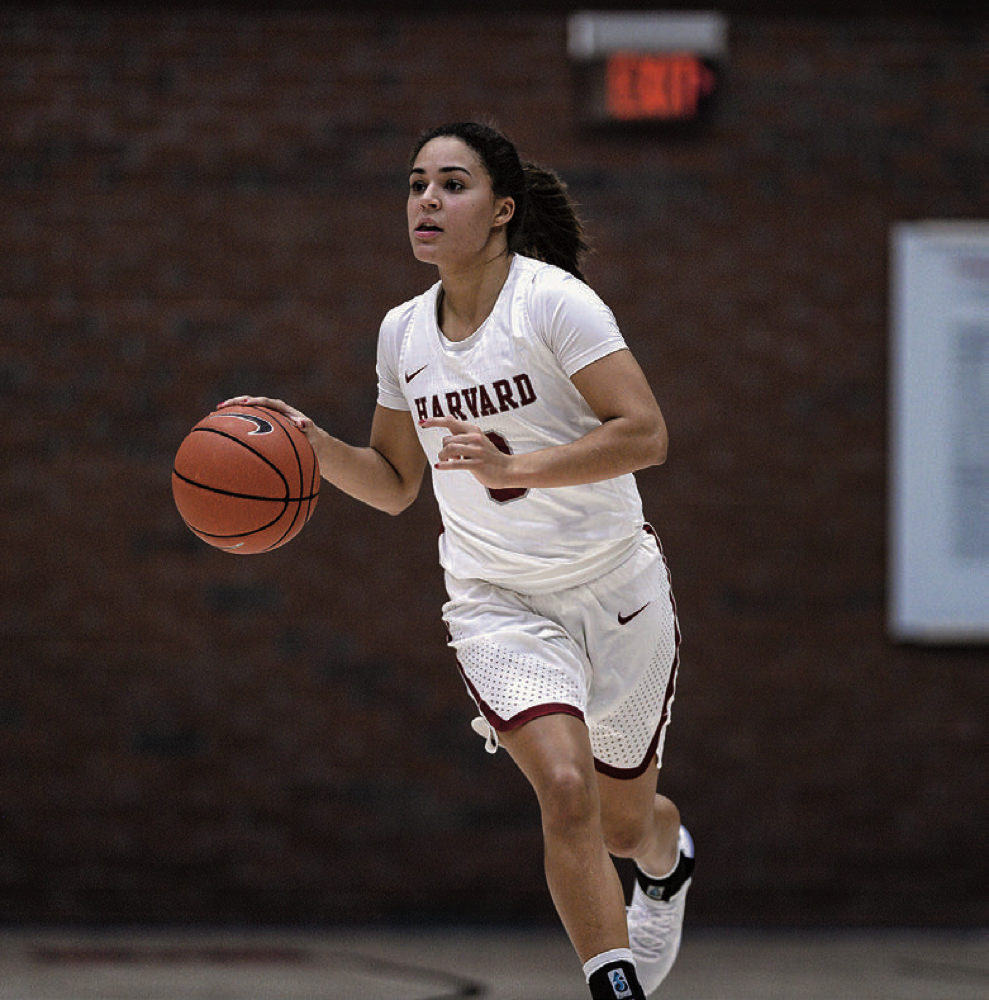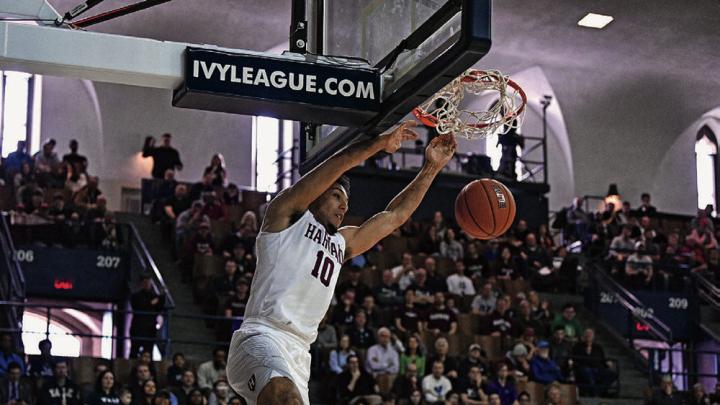Moments after Harvard lost to Yale 97-85 in the Ivy League tournament championship, Stemberg coach Tommy Amaker congratulated the Bulldogs on their victory while sitting in the Eli Trophy Room. Bulldog pawmarks were everywhere: the walls adorned with portraits of famous alumni (including baseball player George H.W. Bush), display cases filled with footballs celebrating the Harvard-Yale rivalry. There was even Yale-branded bottled water in front of the coach and point guard Bryce Aiken ’20, who looked downcast despite having scored 38 points to break his own single-game tournament scoring record. Amaker declared the Bulldogs “very deserving of the victory and representing our conference in the NCAA tournament.”
The previous night, Friends coach Kathy Delaney-Smith had sat in the same spot, staring forlornly at the box score from her team’s 91-62 loss to Penn in the semifinals. The defeat stung because of the stakes, and its lopsidedness was bewildering: during the regular season, the Crimson had split two overtime contests against the Quakers. In her brief opening statement, Delaney-Smith called it “probably one of the most disappointing games I can remember in the last 37 years.”
Although both teams qualified for the National Invitational Tournament (NIT) in late March, they fell far short of early lofty expectations, and coaches and players will spend the off-season trying to understand why.
Last fall, the Harvard men finished first in the Ivy pre-season media poll, and CBS identified the Crimson as a candidate to make a Cinderella run come March. Sensing this potential, Amaker announced that the theme for the year was sacrifice. “If we really embrace that,” he said, “we think we have a chance to have a special year.”

Coach Tommy Amaker and point guard Bryce Aiken ’20, a first-team All-Ivy honoree, led Harvard to a share of the Ivy League championship.
Photograph by Sideline Photos/The Ivy League
These predictions assumed that the team’s best players—Aiken, the 2017 Ivy League Rookie of the Year, and Seth Towns ’20, the 2018 Ivy League Player of the Year—would recover from last year’s season-ending injuries. Instead, neither suited up for the season opener against MIT, when they were listed as out indefinitely.
Without them, the Crimson initially performed unevenly. The highlight was a 74-68 win at St. Mary’s, a perennial mid-major power that had throttled the Crimson 89-71 the previous year. But there was also a low point: Harvard’s 81-63 setback at Dartmouth, the first time in 12 years that the Crimson lost its conference opener to the Big Green. The game signaled a serious problem: porous perimeter defense. Dartmouth shot above 60 percent from the field and more than 50 percent from three-point range—not the kind of defensive prowess that had suffocated Ivy League opponents in previous years.
Aiken returned in the next game, at Howard, and immediately made his presence felt, sinking a three-pointer to get Harvard on the board and pressuring the Bison defense. This created opportunities for his teammates, and with all five Harvard starters scoring in double figures for the only time this season, the Crimson cruised to an 84-71 victory.
That balance declined in Ivy play as Harvard became heavily dependent on Aiken’s scoring and heroics. The guard led the Ivies with 22.2 points per contest in league games and hit many big shots, including a buzzer beater in an 88-86 victory at Yale and two threes in the final minute of regulation during an overtime win at Penn. Then there was the shot of the season: trailing Columbia by three at home, and with the clock winding down in overtime, Aiken hung in the air, ducked under a six-foot-ten defender, somehow kept his balance and squared his shoulders, and sank a deep three-pointer to force double overtime. The shot—which was ESPN SportsCenter’s top play that night—accounted for three of Aiken’s 44 points in a 98-96 triple-overtime victory. After the Crimson finished Ivy play 10-4, tied with Yale atop the standings, Amaker said of Aiken, “We don’t win our league if he is anything less than spectacular.”
But an offense so heavily reliant on one player was not enough to win the Ivy tournament, especially given the team’s injuries (Towns announced in March that he would not play this year) and defensive lapses. In the championship game, only one other Harvard player, Ivy League Rookie of the Year Noah Kirkwood ’22, scored in double figures to go with Aiken’s 38 points. Five Yale players scored in double figures—and seven had eight or more points. That balance, paired with Harvard’s difficulty defending the perimeter, enabled the Bulldogs to score 97 points (the most Harvard has given up since Amaker’s very first game, a 111-56 Stanford blowout in 2007) and pull away from the Crimson for the victory.
Because they were the top seed in the Ivy League tournament, the Crimson received an automatic berth to the NIT, the second-most prestigious post-season tournament. Harvard upset Georgetown 71-68 before losing by one point to North Carolina State in the second round.
The women’s team finished third in the pre-season media poll, but Delaney-Smith had her sights set higher. “I don’t know of a basketball component that we need that we don’t have,” she said in an interview then. The team’s strengths showed clearly in December when the Crimson defeated then-fourteenth-ranked California, Harvard’s first win over a ranked opponent since 1998, when the sixteenth-seeded Crimson knocked off Stanford, a one-seed, in the NCAA tournament.

Next season, coach Kathy Delaney-Smith will have to replace a talented group of seniors, including guard Sydney Skinner ’19.
Photograph by Gil Talbot/Harvard Athletics
But in conference play, the team performed inconsistently. The Crimson beat Penn (which shared the regular-season title with Princeton) in double overtime and played competitively in its other matchups with the Quakers and Tigers, but dropped contests at Columbia and Yale, two teams that failed to reach the Ivy tournament. This up-and-down play led to a 9-5 Ivy finish and earned the Crimson a three-seed in the conference tournament. In the semifinals against Penn, Harvard led 10-9 a little over halfway through the first quarter, but the Quakers finished the period on a 12-0 run and Harvard couldn’t come back. Point guard Katie Benzan ’20 lamented, “To me, at least, it seemed like we lost the game in the first quarter.”
The women received an at-large bid to the NIT, including an opening-round matchup with Drexel at Lavietes Pavilion, the first home post-season basketball game in Harvard history. After the blowout loss to Penn, it seemed a bellwether for the program’s future, and Harvard played with resolve, defeating the Dragons 69-56. Although the Crimson then fell to Georgetown 70-65 in the second round, its strong play in the tournament was encouraging. “I think it validates that we’re there,” Delaney-Smith said, “but it’s just one more step to being what we should have been this year.”
As disappointingly as this year turned out, there is good news. In 2017 and 2018, the Ivy League tournaments were played at Penn’s Palestra, the “cathedral of college basketball.” This year, the competitions were held at Yale’s Lee Amphitheater, in Payne Whitney Gymnasium, the “cathedral of sweat.” Next year, the event will come to Lavietes. The Crimson’s 1,636-seat gym is no cathedral, but Harvard excels at home.

Point guard Katie Benzan ’20 was named to the All-Ivy first team for the third consecutive year.
Photograph by Gil Talbot/Harvard Athletics
Then again, there will be added pressure. The men’s team has seven rising seniors, whom ESPN rated as the country’s tenth-best recruiting class in 2016. Basketball analysts predicted they might lead Harvard to the Sweet 16, but they have yet to reach the NCAAs. The women’s team also boasts talented rising seniors, especially Katie Benzan, a three-time, first-team All-Ivy point guard, and Jeannie Boehm, just the third McDonald’s All American in Ivy League history. Many thought they would return Harvard to the NCAAs for the first time since 2007, but they have yet to do so. Next year represents a chance for both senior classes to realize these expectations on their home floor, but they will still be sweating the outcome—their window of opportunity is closing.









